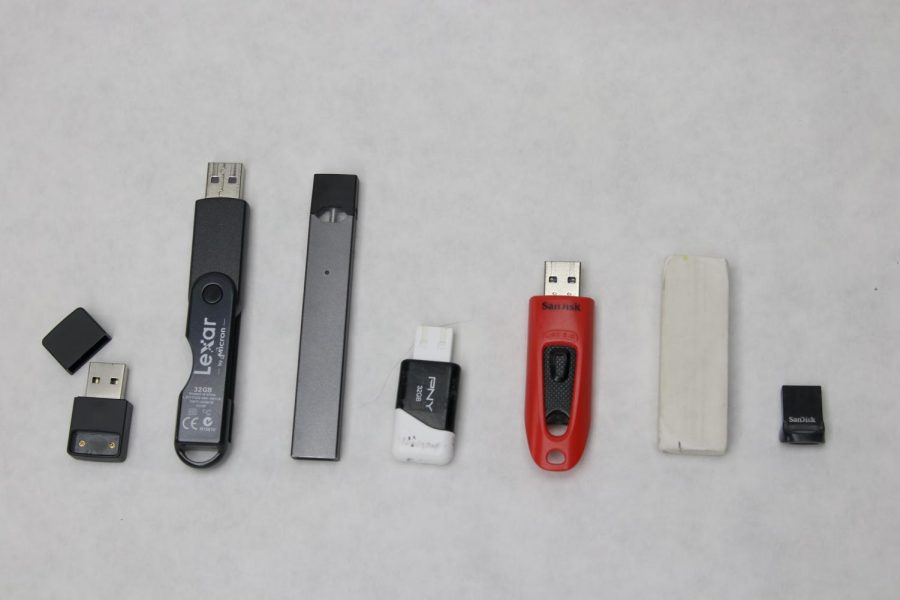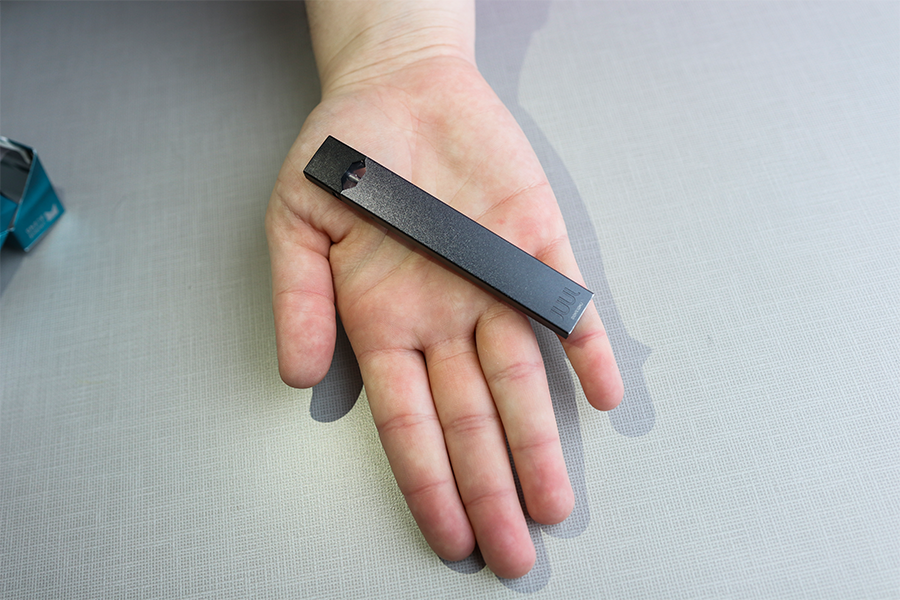Your donation will support the student journalists of Pittsburg High School - KS. Your contribution will allow us to purchase equipment and cover our annual website hosting costs.
Hidden Hits
JUULs increase in popularity, presence hard to detect
December 14, 2018
NOTE: The students interviewed for this story requested anonymity* due to fears of getting in trouble for JUULing on school property, which is against school rules.
While her classmates read Romeo and Juliet out loud, freshman Jessica Adams* sticks her hands under her hoodie to take three hits from an e-cigarette.
Adams uses her hands to air out the vapor underneath her hoodie, and passes the device, disguised in notebook paper, to one of her five friends sitting in the back of the room. The group passes around the e-cigarette until each student gets through three hits.
To the ordinary eye, it looks as if five students are passing notes in class.
“In your eyes, you think, ‘Oh yeah, this is pretty fun because I’m doing something I’m not supposed to be ‘oh, I’m breaking the rules,’” Adams said. “That’s how we all pretty much felt.”
The e-cigarette used wasn’t a vape or hookah pen — it was a JUUL, an e-cigarette that heats an inserted pod containing nicotine and an aerosol that is inhaled. JUUL Pods come in multiple flavors, including cucumber, mango and crème brûlée.
Adams and her friends are not the only PHS students to have fallen for the JUUL. The Booster Redux’s survey of 175 PHS students found that 114 students, or 65.1 percent, have used a JUUL, and 70 of those students have used it on school property.
The students at PHS, however, are a part of a national statistic. Across the U.S., almost one-fifth of middle and high school students have seen a JUUL used in school, according to an April 2018 Truth Initiative survey of more than 1,000 youth between 12 and 17-years-old.
“It’s more prevalent and more of a problem this year,” said Hope Harmon, a registered nurse at the Crawford County Health Department. “You went from not ever hearing about it to it’s in the classrooms within a few minutes time. That tells us that it’s out there and prevalent.”
According to the company’s website, JUUL was founded by two former smokers as an alternative to tobacco cigarettes. But Adams wasn’t using it to curb her smoking habits.
Adams’s history with the JUUL stretches beyond those few seconds in which she took those three hits. She originally became captivated with JUULing immediately after seeing her friend do it.
“It just looked fun,” Adams said. “At first, [my friend] was just like, ‘Do it, it won’t do anything.’ I really thought it wouldn’t do anything. Later on, it became something.”
JUULs contain among the highest nicotine content of any e-cigarette on the U.S market, with one JUUL Pod containing just as much nicotine as a pack of cigarettes, according to the Center for Disease Control and Prevention.
But according to Dr. Susan Pence, a pediatrician at the Crawford County Health Center, the Food and Drug Administration (FDA) does not require JUUL to display all of their ingredients on packaging. The only chemicals that doctors know of are glycerin, water, nicotine and formaldehyde — the same substance that is used to preserve dead bodies.
“The evidence is pretty clear that it is harmful,” Pence said. “It is not any safer than smoking regular cigarettes. It can actually be less safe because we actually don’t [fully] know what’s in them.“
According to Pence, each part of a JUUL equates to a different health risk.
“It’s similar to if you’re in chem lab and you don’t have the hood turned on to get rid of the chemical fumes,” Pence said. “[If you] inhale it, you’re going to get some pretty big irritation in your chest. That can take weeks to go away.”
Adams, for example, began noticing sharp pains in her chest three weeks after she began JUULing.
“I didn’t feel like it was a good thing,” Adams said. “I felt pain and that’s whenever I realized, ‘This is not okay for me. I shouldn’t be giving my body this.’”
The JUUL’s design makes it easier to hide than ever. The devices can be charged in a USB port, and are often mistaken as flash drives. The only signs of a JUUL being used are a vapor and a sweet scent.
“I picked one up the other day and thought it was a portable charger because it looks exactly like something that [a student would] plug into [their] cell phone,” principal Phil Bressler said. “I don’t know how many times people have had them laying on the table and I had no idea.”
Find the JUUL:

Students have developed different strategies to hide their JUULs.
Senior Roger Davidson,* for example, clenches his JUUL into his fist. After taking a hit and holding his breath for five seconds, the vapor from his JUUL dissipates. He does this at least twice during every class period: a teacher has yet to notice.
“I became good at [hiding] it,” Davidson said. “I practiced at first to see if it would work. I was like, ‘How long do I need to hold my breath, how much air do I need to suck in?’ I figured it out within two or three tries and I was just like, ‘Cool. It’s like a smoke trick.’”
Senior Cooper Brown*, on the other hand, doesn’t use his JUUL in classes. Instead, he JUULs in the privacy of a bathroom stall.
“Honestly, it’s kind of satisfying,” Brown said. “It’s like calming because of the nicotine in it. I’ll leave during class once every two days just to use the restroom and JUUL. But if I don’t leave during the class, it’s during passing period.”
In the state of Kansas, the legal purchasing age for JUULs is 18, while the legal purchasing age on JUUL’s official website is 21. Most underclassmen rely on others to help them get their hands on one.
Adams’s friend, who shared her JUUL with Adams, gave money to an 18-year-old senior, who purchased it for her.
And it’s often difficult for students to stop JUULing as soon as they try it. After her first time, Adams went on a nicotine rush. It became a “constant thing” for her. She would take a hit every time she could get her hands on her friend’s JUUL, which was on a daily basis, for three weeks.
“Since we hang out like every single day, I kept doing it, thinking that there was no consequence,” Adams said. “Then I stopped, and whenever I completely stopped, it just felt like really weird, not doing it.”
Eventually, a student spotted Adams and her friends JUULing through their hoodies and told the counselors, who then told administration. When the group had their bags checked, a pod was found in Adams’s bag, and as a result, she was given an out of school suspension for three days.
According to the Pittsburg High School Student Handbook, any student who uses or is in “possession of tobacco, tobacco products or paraphernalia related to the use of tobacco such as lighters, matches, pipes, e-cigarettes” is prohibited. Any student who violates the policy may be subjected to a minimum of a three-day suspension, like Adams was.
High school JUULing has received attention by national news outlets, with the Boston Globe coining it as “the most widespread phenomenon you’ve never heard of,” and CNN calling it an “epidemic.”
However, according to Bressler, it hasn’t reached the point of an epidemic within the high school because JUULing is an individual issue as opposed to a schoolwide issue.
“I think it is what it is,” Bressler said. “I don’t think it’s an epidemic at this point. Is it an issue? Yeah, it’s an issue. There are a lot of issues. We’ve got kids taking prescription pills. I don’t know if that’s [an epidemic] either. The question is when does it become more than just spot issues that we pay attention to?”
Assistant principal Chris Garzone said he worries about the school’s knowledge about JUULing because of the devices’ discrete presence.
“It’s definitely a concern, but are we suspending tons of kids for it? No,” Garzone said. “That’s another concern because if it’s so small, how much of this is going on in our school and we don’t know about it?”
Until a student explained it to her, history teacher Marjorie Giffin had no idea what a JUUL was.
“It’s not that teachers aren’t paying attention to that, and it might be,” Giffin said. “But if I know nothing about it, how would I even know to look for it? To me, it all comes down to leadership and are we being told things? If this is the new fad that’s out there, we need to know about it and to me, that’s the disturbing piece.”
Some students, however, don’t hit their JUULs within the confines of PHS.
Sophomore Ella Miller* can go weeks without touching her JUUL. But when she does, it’s her coping mechanism.
“It is my escape from the world,” Miller said. “It gets me in a zone where it’s like a switch. It helps me turn off all the negative feelings and just focus on the good.”
The FDA has taken measures to curb JUULing among underage teenagers.
In September of 2018, the FDA announced the issuance of more than 1,300 warning letters and civil money penalty complaints to retailers who illegally sold JUUL and other e-cigarette products to minors.
In response to pressure from the FDA, JUUL announced earlier this month that it would no longer accept retail orders for mango, fruit, crème brûlée and cucumber JUUL Pods.
JUUL also plans to shut down its Facebook and Instagram accounts promoting the flavored pods, and will ask Twitter and Snapchat to “police” posts so they are withheld from underage users.
“We learned about it six months after it came out, and I was like, ‘Why would anybody create that product?’” Pence said. “And then I went, ‘Wait, because it’s going to sell really great for kids and young adults.’ It going to sell great because they can hide it: throw it in their purse, throw it in their backpack and somebody’s going to glance at it and not think twice about it. It makes sense — they want to make money.”
Prior to her suspension, Adams was committed to trying to quit, but still faced sudden urges in which she felt that she had to JUUL. She would text her friend and they would JUUL in the bathroom stall in between classes.
But her suspension motivated her to quit more than anything had; even her pain. Since then, her friend sold her JUUL after being suspended, too.
“I like doing it, but now it’s to the point where I do hate it,” Adams said. “I don’t want it to affect me as a person, and [hear] people say, ‘Oh, that’s the girl who got caught JUULing.’”
Other students, however, are continuing to JUUL despite the research on its health risks. Brown said there’s only one reason he would stop JUULing, and that’s if he loses the JUUL that his friend encouraged him to buy.
“[The research] doesn’t concern me that much,” Brown said. “It’s dangerous, but I don’t really think anything of it.”

